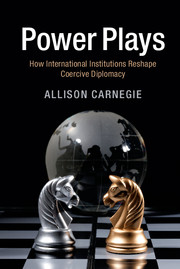Power Plays - How International Institutions Reshape Coercive Diplomacy
Allison CARNEGIE
Availability: Out of stock - available in 10 open days
- Categories: External Relations
- Publisher: CAMBRIDGE UNIVERSITY PRESS
- ISBN: 9781107547506
- Publication Date: 01/09/2015
- Binding: Paperback
- Number of pages: 196
Summary
Coercive diplomacy - the use of threats and assurances to alter another state's behavior - is indispensable to international relations. Most scholarship has focused on whether and when states are able to use coercive methods to achieve their desired results. However, employing game-theoretic tools, statistical modeling, and detailed case study analysis, Power Plays builds and tests a theory that explains how states develop strategies of coercive diplomacy, how their targets shield themselves from these efforts, and the implications for interstate relations. Focusing on the World Trade Organization, Power Plays argues that coercive diplomacy often precludes cooperation due to fears of exploitation, but that international institutions can solve these problems by convincing states to eschew certain tools for coercive purposes.
- Power Plays proposes a new view of coercive diplomacy that will appeal to scholars and students of coercive diplomacy, sanctions, international institutions, globalization and international relations
- Using a multi-method approach, this book presents readers with a variety of evidence including a game theoretic model, case studies and statistical analysis
- The book presents a wide variety of current and historical examples tied to important policy debates
Table of contents
1. Introduction
2. Theoretical framework
3. Bilateral agreements and state similarity
4. WTO membership as a commitment strategy
5. Coercive diplomacy in comparative perspective
6. Agreements and the displacement of coercion
7. Reduced effectiveness of coercion: evidence from the United States
8. Conclusion.
